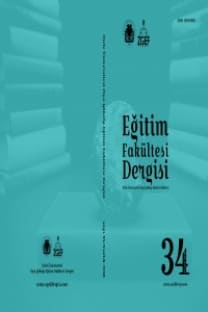DÖRDÜNCÜ SINIF FEN BİLGİSİ ÖĞRETMEN ADAYLARININ TEKNOLOJİ DESTEKLİ BİLİMSEL ARAŞTIRMA WEB-SİTESİ ÜZERİNDEN YAPTIKLARI DİYALOGLARININ İNCELENMESİ
Bu çalışmanın amacı, dördüncü sınıf Fen Bilgisi öğretmen adaylarının Teknoloji Destekli Bilimsel Araştırma (TEDBA) Web-Sitesi Üzerinden Yaptıkları diyalogları incelemektir. Araştırmanın örneklemini, KTÜ Fatih Eğitim Fakültesi Fen Bilgisi Öğretmenliği bölümü dördüncü sınıfta okuyan 117 öğretmen adayı oluşturmaktadır. Bu öğretmen adayları, proje hazırlama ve öğretmenlik uygulamasında teknolojik aletleri kullanma konusunda kendi istekleriyle toplam 32 grup oluşturmuşlardır. Öğretmen adaylarının, TEDBA web sitesindeki diyalogları grup bazında benzerlik ve farklılıklarına göre tema ve kategoriler dâhilinde analiz edilip, basit istatiksel yöntemler (frekans ve yüzde) kullanılarak verilmiştir. Aynı zamanda, diyalogların yeterlik düzeylerinin ve niteliklerinin belirlenmesi için Liang, Ebenezer ve Yost (2010) tarafından önerilen Çevrimiçi Söylemlerin Değerlendirilmesi Rubriği kullanılmıştır. Çalışmanın sonucunda, öğretmen adaylarının ilk defa TEDBA web-sitesi üzerinden akranları ve uzmanlarla iletişim kurmaları ve bunun lisans öğrenimlerinin son dönemine denk gelmesinden dolayı, TEDBA web-sitesini yeterince etkili kullanamadıkları söylenebilir. Bu durumu ortadan kaldırmak için, benzer uygulamaların lisans öğreniminin önceki dönemlerinde yapılmasının daha faydalı olacağı önerilmektedir.
Anahtar Kelimeler:
Fen Bilgisi Öğretmen Adayları, TEDBA Web-sitesi, Diyalog
INVESTIGATING SENIOR SCIENCE STUDENT TEACHERS’ DIALOGUES UNDERTAKEN ON TECHNOLOGY EMBEDDED SCIENTIFIC INQUIRY WEB-SITE
The aim of this study is to investigate senior science student teachers’ dialogues undertaken on Technology Embedded Scientific Inquiry (TESI) Web-site. The sample consisted of 117 senior science student teacher enrolled in Department of Science Education, Fatih Faculty of Education, KTU. To conduct research project and adapt innovative technologies into “Teaching Practice” course, 32 self-created groups appeared. Dialogues in the TESI web-site were thematically analyzed in regard to similarities and differences and presented with simple statistical methods (frequency and percentage). At the same time, to identify competency level and quality of dialogues, Online Discourse Evaluation Rubric developed by Liang, Ebenezer and Yost (2010) was employed. It can be deduced that the senior science student teachers had deficiency using effectively the TESI web-site due to two principal reasons: (a) their first-time experiences concerning communication with peers and experts on the TESI web-site, and (b) the implementation procedure falling into their senior year. To eliminate these pitfalls, it is recommended that similar implementation procedure be undertaken in earlier years of the undergraduate level.
Keywords:
Science Student Teachers, TESI web-site, Dialogue,
___
- Ayvacı, H.Ş., Özsevgeç, T. & Aydın, M. (2004). Data logger cihazının Ohm kanunu üzerindeki pilot uygulaması. The Turkish Online Journal of Educational Technology – TOJET, 3(3), 108-114.
- Bell, P. & Linn, M. (2000). Scientific arguments as learning artifacts: Designing for learning from the Web with KIE. International Journal of Science Education, 22(8), 797-817.
- Bozkurt, E. & Demir, R. (2013). Öğrenci görüşleriyle akran değerlendirme: Bir örnek uygulama. İlköğretim Online, 12(1), 241-253
- Çalık, M. & Ayas, A. (2008). A critical review of the development of the Turkish science curriculum. In R.K. Coll and N. Taylor (Eds.), Science Education in Context: An International Examination of the Influence of Context on Science Curricula Development and Implementation, 161–174, AW Rotterdam: Sense Publishers B.V.
- Çalık, M., Özsevgeç, T., Küçük, Z., Aytar, A., Artun, H., Kolayli, T., Kiryak, Z., Ültay, N., Turan, B., Ebenezer, J., & Coştu, B. (2012). Analyzing senior science student teachers’ environmental research projects of scientific inquiry: A preliminary study. Paper accepted as an oral presentation at World Conference on Education Sciences, 02-05 February 2012, Barcelona, Spain
- Çepni, S. (2009). Araştırma ve proje çalışmalarına giriş. Genişletilmiş 4. Baskı, Trabzon: Üçyol Kültür Merkezi.
- de Vries, E., Lund, K. & Baker, M. (2002). Computer-mediated epistemic dialogue: Explanation and argumentation as vehicles for understanding scientific notions. The Journal of the Learning Sciences, 11(1), 63-103.
- Duschl, R. & Osborne, J. (2002). Supporting and promoting argumentation discourse in science education. Studies in Science Education, 38, 39-72
- Duschl, R., Ellenbogen, K., & Erduran, S. (1999). Understanding dialogic argumentation among middle school science students. Paper presented at the annual meeting of the American Education Research Association, Montreal, Canada.
- Ebenezer, J. & Puvirajah, A. (2005). WebCT dialogues on particle theory of matter: Presumptive reasoning schemes. Educational Research and Evaluation: An International Journal on Theory and Practice, 11(6), 561-589. Special Issue: The Role of Research in Using Technology to Enhance Learning in Science. Guest Editors: Zacharias C. Zacharia and Constantinos P. Constantinou.
- Ebenezer, J.V. Kaya, O.N. & Ebenezer, D.L. (2011). Engaging students in environmental research projects: perceptions of fluency with innovative technologies and levels of scientific inquiry abilities. Journal of Research in Science Teaching, 48(1), 94-116.
- Hoadley, C. M. & Linn, M. C. (2000). Teaching science through on-line peer discussions: Speakeasy in the knowledge integration environment. International Journal of Science Education, 22, 839-857.
- Hogan, K., Nastasi, B. K. & Pressley, M. (2010). Discourse patterns and collaborative scientific reasoning in peer and teacher-guided discussions. Cognition and Instruction, 17(4), 379- 432
- International Society for Technology in Education (2008). National educational technology standards http://www.iste.org/Content/NavigationMenu/NETS/ForTeachers/2008Standards/NETS _for_Teachers_2008.htm Retrieved September 12, 2008, from
- Liang, L. L., Ebenezer, J. & Yost, D. S. (2010). Characteristics of pre-service teachers’ online discourse: The study of local streams. Journal of Science Education and Technology, 19(1), 69-79.
- National Research Council (1996). National science education standards. Washington, DC: National Academy Press.
- Özsevgeç, T. (2011). Computer literacy of Turkish preservice teachers in different teacher training programs. Asia Pacific Education Review, 12(1), 13-21
- Polman, J. & Pea, R. (2001). Transformative communication as a cultural tool for guiding inquiry science. Science Education, 85(3), 223-238.
- ISSN: 1305-0060
- Yayın Aralığı: Yılda 2 Sayı
- Başlangıç: 1995
- Yayıncı: Dicle Üniversitesi
Sayıdaki Diğer Makaleler
SOSYAL BİLİMLER İÇİN İSTATİSTİK
ALTINCI SINIF ÖĞRENCİLERİNİN BAZI TEMEL MATEMATİK KAVRAMLARI ANLAMA DÜZEYLERİ
Kürşat YENİLMEZ, Hanife DEMİRHAN
SOSYAL BİLGİLER DERS KİTAPLARINDA SÖZLÜ VE YAZILI EDEBÎ TÜRLERİN KULLANIM DURUMU
SOSYAL BİLGİLER ÖĞRETMEN ADAYLARININ ÖZ-YETERLİK İNANÇ DÜZEYLERİNİN BELİRLENMESİ ÜZERİNE BİR ÇALIŞMA
SINIF ÖĞRETMENLİĞİ 2. SINIF ÖĞRENCİLERİNİN GÜZEL SANATLARA YÖNELİK TUTUMLARININ DEĞERLENDİRİLMESİ
İlhami BULUT, Ali Osman ALAKUŞ, Barış AYDIN
ÖĞRETMEN ADAYLARININ MATEMATİK OKURYAZARLIK DÜZEYLERİNİN BELİRLENMESİ
DOKTORA TEZ SÜRECİNDE KARŞILAŞILAN PROBLEMLERİN BELİRLENMESİ: EĞİTİM FAKÜLTESİ ÖRNEĞİ
Hava İpek AKBULUT, Salih ÇEPNİ, Çiğdem ŞAHİN
Ramazan KAYA, Aydın GÜVEN, Zekerya AKKUŞ, Hasan GÜNAL
